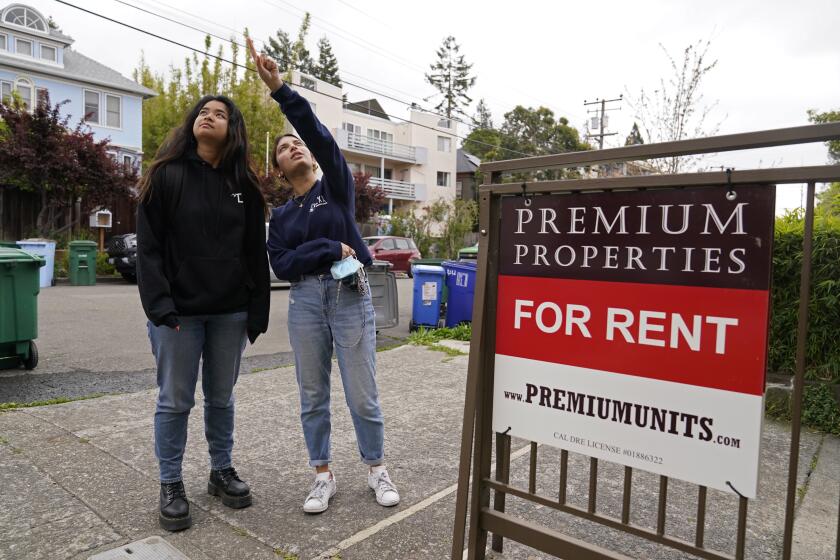Ex-Entrepreneur Parlays Expertise on Asian Business Into a TV Series : Strategy: Yue-Sai Kan says patience and knowing the customs are critical. She learned those lessons firsthand before becoming a broadcaster.
With viewership as large as 400 million, you might think American broadcaster Yue-Sai Kan would be content with the size of her television audience.
However, that audience lives in mainland China, and although Kan appreciates the viewer support, she also has been thinking about an audience closer to home. Kan is happy about the popularity of her commercially sponsored series on the Chinese government network, a broadcast monopoly that had not previously allowed ads. But she has long wanted a chance to make a splash on American network television.
That opportunity has come. Kan is producer and on-camera host of “Doing Business in Asia,” a four-part series airing this fall on America’s Public Broadcasting Service. The woman who brought commercial-sponsored television to China is beginning to bring Asian capitalism to non-commercial television in the United States.
The series is designed to help American business people succeed in four Asian markets: Japan, Hong Kong, Taiwan and South Korea. Out of it comes a message that stems from Kan’s experience in Asia: take time to learn more about local customs and potential contacts and customers before pursuing a deal.
Each half-hour program discusses the etiquette and social customs particular to each of the Asian locations. The weekly segments explore the historical factors affecting business practices, the cultural psychology involved in business conduct and the language problems. Beginning this week, KCET-TV will broadcast the series locally at 2:30 p.m. Saturdays.
Shot on location, each program presents case studies of Western companies and entrepreneurs who are succeeding in Japan, South Korea and the capitalist enclaves of Taiwan and Hong Kong. Subjects range from corporate giants such as Estee Lauder, Citibank, Coca-Cola and International Business Machines to small providers of services to American importers with Asian operations.
The series expands Kan’s presence. Her company, the New York-based Yue-Sai Kan Inc., has published guidebooks and textbooks and produced television specials related to China for Western audiences. Kan is now offering instructional books and videotapes of her “Doing Business in Asia” series to corporations.
Kan, ebullient in manner and speech, said she has tried to bring to the series insight from her years in trade and television production. For example, it’s important to develop strong relationships with potential customers in Asia, she said.
“Maintaining a personal touch on a face-to-face level is very important because (Asians) need to feel that they can trust you,” Kan said. “The more you get to know someone, the better the business prospects.”
Kan’s business contacts in Asia and her reputation as a producer of documentary series were selling points when she approached Seattle public television station KCTS-TV about co-producing the programs, said Jessica McCann, a spokeswoman for the station. KCTS, a leading producer of programs on Asian life, wanted an opportunity to present Kan to a wider American audience, McCann said.
“It was an ideal offer because Yue-Sai is an Asian expert, and she’s done so many programs in the past,” McCann said. “She’s also dynamic, and that’s important because it’s hard to keep this kind of series entertaining and intelligent simultaneously. She brings a freshness to the subject of doing business in Asia.”
Kan’s route to business and the West was circuitous. Born in Guilin, China, in 1948, she was raised in Hong Kong after her parents fled the mainland during the Communist revolution. She later moved to the United States--first to study music in Hawaii, then to New York in 1971.
Kan and her sister Vickie took the entrepreneurial plunge in 1976, launching an import-export company in New York. They dealt consumer products like typewriter ribbons, clothing, pillowcases and hardware to customers in Asia. By cultivating contacts, Kan and her sister quickly turned their fledgling firm into a multimillion-dollar business.
While the business grew, so did Kan’s interest in television. Her involvement began when she accepted a position as television news anchor on a Manhattan cable program in 1972.
Gambling that she could be more successful in television, she sold her interest in the trading company in 1980 and invested $500,000 in a television production company. The company’s “Looking East,” a 1981 series on Asian culture, is now in syndication.
Kan’s big break came in 1984, shortly after the Public Broadcasting System agreed to broadcast two hours of live satellite feed from Beijing of events commemorating the 35th anniversary of China’s revolution. PBS discovered just two days before the broadcast that the satellite relay would include no English translations. PBS searched for someone who could translate and explain the nuances of Chinese culture. They found Kan.
Chinese government officials were so impressed with the broadcast that they awarded Kan a contract for a series on Western life. The series, “One World,” was the first program produced by a foreigner for China’s government-run network. The programs and commercial messages from sponsors like Proctor & Gamble, General Foods and Gillette have been broadcast in uncensored form since 1987.
As a result of “One World,” Kan collected enough Chinese government guanxi-- “connections”--to secure approval for a number of projects. Recently, for example, she produced a syndicated special called “Journey Through a Changing China.” Kan’s ABC-TV network special, “China: Walls and Bridges,” won an Emmy last year.
“From my television production, I learn that you need to get in touch with high-level people (in Asia) to get things done,” Kan said. “It’s important to find someone reputable to introduce you, because this person becomes your guarantor.”
Building trust takes time in Japan and South Korea, Kan said, adding: “If you expect to . . . do business on your first trip, don’t go to Japan or Korea--because it just won’t work.”
In fact, patience is one of the five keys to success in Japan--keys that Kan dubs the “five Ps.” The kind of product exposure she calls “presence” is a second. Strategy or “preparation” is a third. Quality of the “product” is the fourth and observing “protocol” the fifth, Kan observes in one series segment.
Kan has produced a separate program on each of the four Asian markets because protocol and business cultures vary. For example, deals can be consummated relatively quickly in Taiwan because the overwhelming number of businesses are small and entrepreneurial. However, Japan is dominated by big firms that require managers at various levels to sign off on a deal, she said.
“You have to be sensitive to local customs and ‘do as the Romans do,’ ” Kan said. “For expansion into Asia and (financial) globalization, you need localization. You must localize your thinking, localize your product and localize your strategy.”






